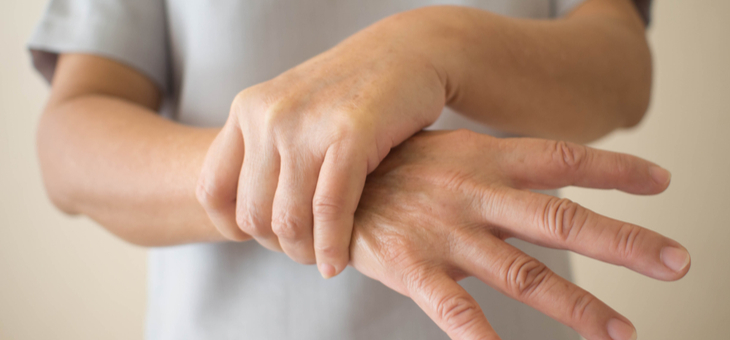If you’ve ever noticed a muscle or an eyelid flutter or twitch involuntarily, you’re not alone. It happens to everyone, for a multitude of reasons, though for most people it is relatively infrequent.
If you experience twitches, cramps or spasms, these may be the reasons why.
Stress
Stress and anxiety are known for keeping you awake at night, but they can also cause pain and tension in your muscles. If you’ve been feeling stressed, you may find that the muscles in your neck, shoulders and back are tighter than usual. Stretching, yoga, meditation and massage can help to relieve this tension.
Too few electrolytes
While you may roll your eyes at brightly coloured ‘sports drinks’ and their supposed health benefits, there is some truth to their claims about electrolytes. Your muscles rely on minerals such as magnesium and potassium to function. Illnesses that result in vomiting or diarrhoea, some medicines and excessive sweating during exercise may deplete you of electrolytes, causing your muscles to cramp and spasm. Similarly, dehydration is a common cause of muscle cramps and twitches.
Too much caffeine
While your daily coffee may help get you out of bed in the morning, it also gives your muscles a rush of energy that can cause them to twitch. If this is a problem for you, try to reduce the amount of caffeine or other stimulants you consume.
Too little sleep
If your muscles are feeling sore and achy, or you’ve noticed them twitching, you may be run down or over tired. Try to regulate your sleep pattern and ensure you’re getting enough sleep each night.
Too little exercise
If you’ve been for a walk or workout and noticed your muscles spasming afterwards, it may be because they don’t get used enough. Building up your muscles with more regular exercise and strength training will help to reduce this cramping.
Medicines
Some medicines such as those that treat epilepsy and psychosis can cause your eyelids to twitch. Others, such as diuretics, which cause you to urinate more frequently and lose potassium, or those for high blood pressure and heart disease, are also known to cause muscle spasms.
Pinched nerve
A pinched spinal nerve needs to be diagnosed by your doctor with the help on an MRI or CT scan. It occurs when the nerves leaving the spinal cord are pinched by ruptured or slipped spinal discs. This can change muscle and nerve control.
Eye twitches
Have you ever felt your eyelid fluttering or twitching of its own volition? These slight, temporary twitches are called myokymia and can affect the upper or lower eyelids. They can be caused by a number of factors including bright light, poor sleep, smoking, stress, wind or caffeine.
If these twitches don’t go away after a few days, it may be a sign of something more serious. This may be glaucoma, dry eyes or in some rarer cases it may be a sign of nerve or brain disorders such as Tourette’s syndrome, multiple sclerosis or Bell’s palsy. However, these conditions cause a number of other symptoms, so flickering eyelids alone are not enough to cause concern.
Amyotrophic lateral sclerosis (ALS)
An early symptom of ALS – also known as Lou Gehrig’s disease – is twitching in the hands and feet. This condition causes the nerves that pass messages between the brain, spinal cord and muscles to stop working. These messages become irregular and eventually stop altogether.
Kidney disease
Muscle cramps may be a symptom that your kidneys are slowing down and becoming less efficient. However, it is uncommon for kidneys to show any single early warning sign, so muscle cramps that are unaccompanied by other symptoms are usually unrelated to the kidneys. Consult your doctor if you notice muscle spasms and have high blood pressure, diabetes or another kidney-related issues.
Do your muscles ever twitch involuntarily? Have you noticed this throughout the day or while lying in bed at night?
If you enjoy our content, don’t keep it to yourself. Share our free eNews with your friends and encourage them to sign up.
Related articles:
https://www.yourlifechoices.com.au/health/news/sleep-issues-linked-to-heart-attacks
https://www.yourlifechoices.com.au/health/wellbeing/why-strength-training-is-critical
https://www.yourlifechoices.com.au/health/wellbeing/is-it-sciatica
Disclaimer: This article contains general information about health issues and is not advice. For health advice, consult your medical practitioner.

